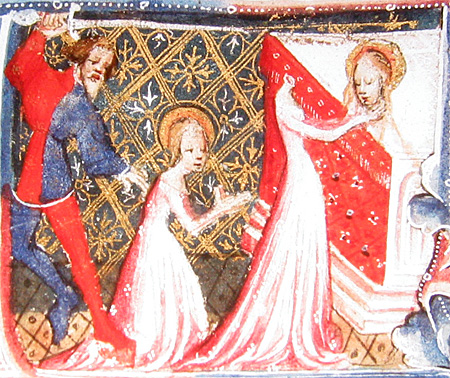 |
 |
|||
|
|
Aude Wyry (the Virgin) is the correct form of the name
commonly anglicized to Juthwara. She was born of noble parents, the
daughter of Lord Perphir (also called Galon) from Penychen (in South Wales).
She was part of a large family of nine brothers - amongst them
Paul, Pautel, Nautel and Bana
(also called Gwrgi) - as well as three sisters - herself,
Sidwell and
Weluela (a third fourth sister, Edwara is sometimes
mentioned but this is simply an alternative form of Juthwara).
Their mother died when several of them were still teenagers. Their father
married again and they settled in Halstock in eastern Dumnonia (Dorset),
while the volatile Bana was away at the court of King Childebert I of
Paris. Aude grew pale and waxen with grief, and her
step-mother asked her the cause. She replied that she was suffering from
pains in her chest. The stepmother advised the application of soft cheese
and then told the newly-returned brother that Juthwara was a wanton women
who had brought shame on the family by getting herself pregnant. At first,
Bana was incredulous, so the stepmother told him to examine Aude's
underclothes, for he would find them covered in milk. The young man rushed to find his sister and, finding
her washing clothes after having returned from church, he openly accused
her of sleeping around. Aude was, naturally, shocked by this wild and
inexplicable allegation and even more so when her brother physically
attacked her in order to drag out her underclothes. Of course, Bana
immediately felt the moisture of the healing cheese and, in a blind fury,
drew his sword and cut off poor Aude's head. A fountain of water
immediately sprung up on the spot, as well as a great oak beginning to
grow. The girl, meantime, took up her head, walked to their house, put on
her head again, reproached her brother and subsequently dropped down dead.
Aude was buried in the church in Halstock until translated to Sherborne
Abbey on 13th July sometime in the 1040s or 50s. She died on 6th January,
although her most popular feast day is that of her translation. Bana is said to have repented of his crime and went off
to Brittany to consult with his brother, St. Paul at Léon. St. Paul
advised him to retire into a forest near Landerneau as a penance, and
there fast and pray for forty days. The penance accomplished, Bana
returned to his brother, who admitted him as a monk in his monastery,
eventually sending him to be superior of a cell he had established at
Gerber, afterwards called Le Relecq, where he changed his name to Tangwy.
Records of St. Juthwara date back to the 14th century. She is generally considered legendary.
|
|||
| © Nash Ford Publishing 2006. All Rights Reserved. | ||||





 St. Aude Wyry
St. Aude Wyry